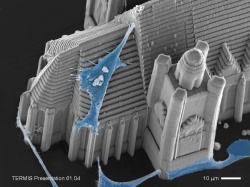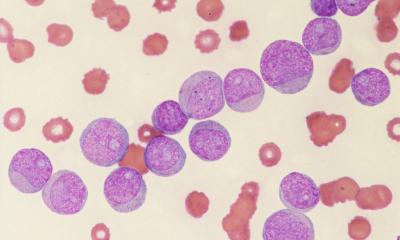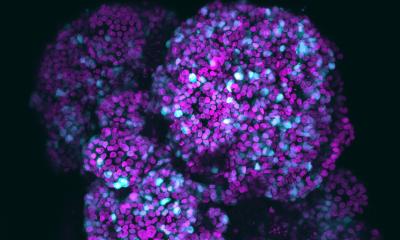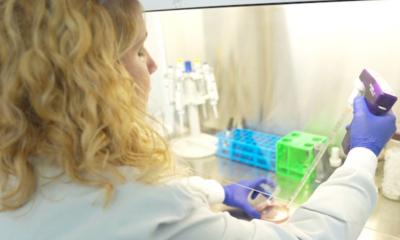Embracing a nano-size silken promise
Artificial vascular trees, the growing of heart tissue, nerve regeneration: The World Congress of the Tissue Engineering and Regenerative Medicine International Society (TERMIS) held in Vienna this October offered an impressive display of current developments in tissue reconstruction and regeneration, Michael Krassnitzer reports


The congress was also the venue for a meeting of the Who’s Who in the field of silk fibroin, a protein obtained from – and one of the two components of – natural silk. ‘Silk fibroin is the best material in the world, enthused Professor David Kaplan, Director of the Bioengineering and Biotechnology Centre at Tufts University in Massachusetts, USA, and a pioneer in this field. It was he who, in a paper published ten years ago, laid the foundations for the use of silk for tissue reconstruction and regeneration.
Silk fibroin is not detected as foreign matter by the immune system and is therefore not rejected by the body; it grows into the body’s own tissue without any problems and is only broken down slowly. Silk fibroin is harder than steel and is therefore also used in the production of bullet-proof vests. Above all, silk fibroin can be tuned into any desired form: fibres, gels, sponges or particles. At the Ludwig Boltzmann Institute for Clinical and Experimental Traumatology in Vienna, the St. Stephen’s Cathedral the famous landmark of the Austrian Capital – was reproduced in nanosize from silk fibroin and then colonised with cells (see images) especially for this congress.
In the future, silk protein is likely to be used in this way, as a material for pedestals used for tissue regeneration. A three-dimensional silk matrix is colonised with stem cells inside a bioreactor. Growth factors integrated into this construction ensure that the stem cells develop into the desired tissue type. ‘About a year after the implantation the silk fibroin will have been broken down and been replaced by the body’s own tissue,’ explained Dr Andreas Teuschl, Head of the City of Vienna Competence Team Tissue Engineering at the University of Applied Sciences Technikum Wien. The procedure is suitable for the regeneration of hard as well as soft tissue. Very promising preclinical results already indicate numerous opportunities for silk protein application, particularly in the musculoskeletal system. In the USA recently, the first silk-based medical product was licensed: a fibre mesh for soft tissue reconstruction.
Prof. Kaplan is convinced that silk fibroin nano-size particles could also be used for drug delivery or drug targeting: ‘Through the design of the silk particles we could determine exactly what amount of a substance is released in which part of the body under what conditions and which cell type is the objective.’ Due to its unique properties silk fibroin could serve as the basis of a ‘new generation of high-tech medical products’ with a range extending right down to fully implantable and degradable optical and electronic interfaces, he emphasised. The concentration of silk fibroin with various proteins could give the material additional biologically effective qualities, such as anti-inflammatory ones. ‘With the help of protein chemistry,’ he added, ‘silk fibroin could be given fantastic new functions.’
Profiles:
Professor David Kaplan holds an Endowed Chair, the Stern Family Professor of Engineering, at Tufts University in Massachusetts. He is Professor and Chair of the Department of Biomedical Engineering and also holds faculty appointments in the Department of Chemical and Biological Engineering, Department of Chemistry, Tufts University School of Medicine and Tufts University School of Dental Medicine. His research focuses on biopolymer engineering to understand structure-function relationships, with emphasis on studies related to self-assembly, biomaterials engineering and functional tissue engineering. He has published more than 400 papers, edited eight books, serves on the editorial boards of numerous journals and is Associate Editor for the journal Biomacromolecules
DI Dr Andreas Teuschl heads the City of Vienna Competence Team Tissue Engineering Bioreaktoren, Department of Biochemical Engineering, University of Applied Sciences Technikum Wien in Vienna. He studied biochemistry at the Technical University Vienna. His PhD thesis was on Silk Fibrion – a versatile and tunable biomaterial for tissue engineering and regenerative medicine. During his studies, he worked at the Ludwig Boltzmann Institute for Clinical and Experimental Traumatology in Vienna, which forms a research cluster with – among others – the Technical University and the Medical University of Vienna.
29.10.2012










